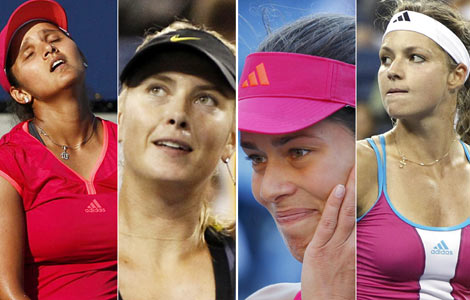Reality kicks in
Updated: 2011-09-08 15:59
By Sun Li (China Daily)
|
|||||||||
 |
|
The top five contestants of this year's Happy Girl show hosted by Hunan Satellite Television. Provided to China Daily |
The heady days of Super Girl seem to be over with both the quality of contestants and judges leaving much to be desired. Sun Li reports.
Reality television singing competitions, the once king of reality shows on China's small screen, are losing their bite.
Although Super Girl, a trail-blazing reality show hosted by Hunan Satellite Television and China's answer to American Idol, has entered its eighth year, many viewers feel the program has become boring and is incapable of replicating its earlier success.
"Super Girl-like reality singing shows are everywhere on TV now," says Che Xudong, a die-hard fan of reality shows, who works for an advertising agency in Nanjing, Jiangsu province. "But good singers are so few."
Says Li Hao, director of the editor's office, Hunan Satellite Television, "Let's face it. The heyday of reality singing shows is over.
"Super Girl (which became Happy Girl in 2009) spawned a number of similar shows on other stations, including CCTV (China Central Television)."
"(So) it is natural for audiences to be less passionate about the program. It has been on the air for too long. Besides, other novel shows have come up contributing greater variety to China's reality TV programming," Li adds, referring to other talent shows, dating shows and TV recruitment programs, such as Dragon TV's China's Got Talent, Jiangsu Satellite TV's If You Are The One and Tianjin Satellite TV's Only You.
Li says talent shows, where participants not only sing, but also dance and present mime and acrobatics, help create a more multifaceted stage.
He says dating shows and TV recruitment programs are popular because they fulfill to people's demands.
"Today, finding a decent job or a suitable date may be more important and meaningful than being a singing star," Li says.
But the fading appeal of reality television singing competitions is not just a matter of the growing popularity of other kinds of reality shows.
Han Naiqing, senior researcher with China Radio and Television Association and a veteran reality TV programmer, says shows such as Super Girl must take most of the blame themselves.
Han points out that most contestants in recent years have been run of the mill, and are no match to the early stars such as Li Yuchun and Zhang Liangying.
"When a reality singing show cannot identify and celebrate people with a stunning voice, how can you expect people to watch it," Han asks.
The other problem with these shows is the quality of the judges, Han explains. "A judge with a tongue as sharp such as Simon Cowell's can greatly enhance a show's influence and boost its rating," he says, adding the popularity of the dating show, If You Are The One, owes a lot to its bald-headed panelist Le Jia, whose comments are always full of witticisms.
In contrast, the judges of reality singing shows, Han says, have either little knowledge of music or spew such empty talk that it is embarrassing to watch.
One way out of this mess, Han says, is to have programmers set the bar high for both contestants and judges so that the audience does not feel cheated.
Han says considering the fact that Chinese TV programmers lag behind their Western counterparts in creating an original show, it is more advisable to buy the copyright of a foreign reality show than to copy it.
As part of the Got Talent franchise, China's Got Talent receives assistance and guidance from its British producers. Likewise, Southeast Satellite Television's Happy Choir, a reality singing show that puts the spotlight on chorus singing and is based on BBC's Last Choir Standing show, is able to leverage BBC's professional expertise, Han says.
"It is better for us to learn how to do a reality singing program from our Western peers after buying the copyright. This also applies to other kinds of reality shows," he says. "Before creating an original show, it's important to understand how to run a show well."










